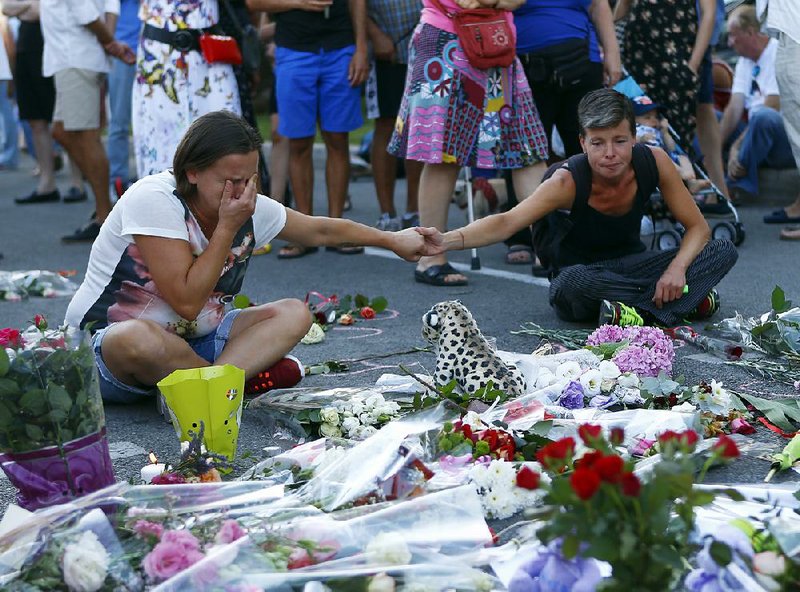NICE, France -- France's interior minister increased security measures across the country late Saturday, calling upon thousands of reservists to help as he faces criticism over alleged police and security failures in the deadly Bastille Day truck attack in Nice.
The Islamic State militant group announced earlier that the Tunisian driver, who barreled a truck through the holiday crowd in the southern French city, was one of its "soldiers." It was the group's first claim of responsibility for the attack that killed 84 people at a fireworks display.
On Saturday, France began three days of national mourning in homage to the victims. That didn't stop politicians from sniping at one another over who bore responsibility for failing to stop the attack.
Interior Minister Bernard Cazeneuve announced that he would call up 12,000 police reserves in addition to more than 120,000 police and soldiers already deployed around the country "because of the terrorist threat."
The Islamic State claim -- circulated on social media by a news outlet affiliated with the group -- didn't name Mohamed Lahouaiej Bouhlel, the 31-year-old Tunisian whom authorities say was behind the wheel as a truck crashed into revelers Thursday night.
The statement quotes an Islamic State security member as saying Bouhlel was following the Islamic State's calls to target citizens of the countries fighting the extremists. The group's claim couldn't immediately be verified, but French officials didn't dispute it.
"I remind you that Daesh's ideologue, Abu Muhammad al-Adnani, has for several weeks repeated calls to attack directly, even individually, Frenchmen, in particular, or Americans, wherever they are, by any means necessary," Defense Minister Jean-Yves Le Drian said Saturday. Daesh is the Arabic name for the Islamic State.
"It is murder, and Daesh's claim of responsibility comes later, as has happened in other recent events," Le Drian added. "Even if Daesh doesn't do the organizing, Daesh inspires this terrorist spirit, against which we are fighting."
What is known publicly about Bouhlel so far suggests a troubled, angry, sometimes violent man with little interest in the group's ultra-puritanical brand of Islam. His father, in Tunisia, said his son did not pray or fast for Ramadan. Neighbors described Bouhlel, the father of three, as a volatile man, prone to drinking and womanizing.
But in a statement to reporters, Cazeneuve hinted that Bouhlel may have had a last-minute adoption of a more extremist worldview.
"It seems he was radicalized very quickly," Cazeneuve said after a ministerial meeting at the Elysee Palace in Paris.
Bouhlel had a history of petty crime going back to 2010. He received a six-month suspended sentence this year for assaulting a motorist, but was not on the radar of French intelligence agencies.
It's also unclear whether Bouhlel, who was shot dead by police Thursday night, had been acting alone.
The Paris prosecutor's office said Saturday that five people are in custody in relation to the attack. One man was detained late Friday, according to the office of Paris prosecutor Francois Molins, and authorities detained Bouhlel's ex-wife Friday for questioning.
Three people were detained Saturday in the attack, including one person who is thought to have spoken to Bouhlel by phone minutes before he started his deadly journey down Nice's Promenade des Anglais.
Regional council president Christian Estrosi -- a member of France's opposition Republicans -- in an open letter described the country's current Socialist leadership as "incapable." He said he had asked that police be reinforced in Nice ahead of the fireworks display but was told that there was no need.
Cazeneuve disagreed, saying that high security had been assured in the region -- including at the Cannes Film Festival and the Nice Carnival. Government spokesman Stephane Le Foll warned against attempts to divide the country, calling for "unity and cohesion."
Still, the message was heard, prompting the security announcement later from Cazeneuve.
France is heading into elections next year, and President Francois Hollande is facing multiple challengers, from within his own Socialist Party, from the Republicans and from the far-right National Front.
As French security chiefs met in Paris, Nice's seaside boulevard, the Promenade des Anglais, was slowly returning to normal. A makeshift memorial of flowers, candles and messages is near one end of the expansive avenue.
"It's satisfying to see life coming back," lawmaker Eric Ciotti told France's iTele broadcaster from the promenade. "It's a sign that life is coming back even if, naturally, nothing will erase those images of horror. ... Never since World War II has Nice ever seen such horror."
People returned to the beach Saturday, although in far smaller numbers than in the days before the attack.
The promenade reopened to vehicular traffic Saturday afternoon. It had been closed to traffic for the Bastille Day fireworks celebration and remained closed after the truck attack, which turned 1.5 miles of the roadway into a crime scene.
Although there were signs of a return to normal, the attack was fresh in the minds of many. Even two days after the attack, some families were still going from hospital to hospital in search of people who had disappeared in the attack's bloody chaos.
Officials said 202 people were wounded in the attack, and 25 of them were on life support late Friday.
Information for this article was contributed by Colleen Barry, Sarah El Deeb and Raphael Satter of The Associated Press; by Alissa J. Rubin, Aurelien Breeden, Lilia Blaise, Rukmini Callimachi, Benoît Morenne and Nour Youssef of The New York Times; and by Michael Birnbaum, James McAuley, Rick Noack, Annabell Van den Burghe, Souad Mekhennet, Brian Murphy, William Branigin, Carol Morello and Griff Witte of The Washington Post.
A Section on 07/17/2016
